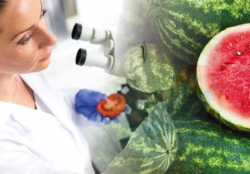Detoxifying Effects of Lycopene
 Lycopene, a pigment found in certain red fruits and vegetables, is known for its role in helping reduce the risk of prostate cancer.1
Lycopene, a pigment found in certain red fruits and vegetables, is known for its role in helping reduce the risk of prostate cancer.1
Researchers have now found that lycopene can help prevent damage caused by toxins in our environment and food.2
Toxins are all around us—in the air we breathe, the water we drink, and the food we eat. They bombard our system, causing damage that accumulates over time and is a major contributor to chronic disease.3,4
It’s impossible to avoid most toxins. But research over the last several decades suggests there is a way to reduce the damage they inflict.
A 2019 review found that lycopene can help neutralize the effects of a wide variety of harmful compounds, from natural toxins to man-made chemicals.2
One analysis found those with the highest serum concentration of lycopene had a 26% lower risk of stroke, a 14% lower risk of cardiovascular disease, and a 37% lower mortality risk.5
The most common toxins are:2
 Metals and other elements with toxic activity, such as cadmium, mercury, and lead (which can appear in ground water, air emissions, and elsewhere in the environment),
Metals and other elements with toxic activity, such as cadmium, mercury, and lead (which can appear in ground water, air emissions, and elsewhere in the environment),- Synthetic pesticides, including herbicides, insecticides, rodenticides, and fungicides (which are widely used in agriculture and around homes in urban areas),
- Drugs with toxic side effects used to treat disease, such as cancer chemotherapy drugs,
- Environmental toxins produced by industry, automobiles, and burning of fossil fuels and other products, and
- Natural toxins , such as those produced by some bacteria or fungi.
Toxins contribute to a wide range of chronic diseases. The American Lung Association lists air pollutants alone as a potential cause of:3
- Cancer,
- Reduced fertility due to damage to the ovaries or testes,
- Damage to the brain and other parts of the nervous system,
- Birth defects,
- Coughing and wheezing, possibly leading to chronically impaired lung function, and
- Damage to the cardiovascular system, potentially contributing to cardiovascular disease.
Lycopene Fights Toxins
Lycopene is a bright red pigment found in several fruits and vegetables, notably tomatoes, guavas, and watermelon.
It is a member of the carotenoid family of nutrients, which include beta-carotene, lutein, and zeaxanthin.
Lycopene is a free radical scavenger that shows activity against many toxins.
How Lycopene Works
 Toxins induce oxidative stress, releasing free radicals that attack and damage cells and tissues. Oxidative damage to lipids, proteins, and DNA is a contributor to age-related chronic disease.
Toxins induce oxidative stress, releasing free radicals that attack and damage cells and tissues. Oxidative damage to lipids, proteins, and DNA is a contributor to age-related chronic disease.
Lycopene acts in multiple ways to stop this damage. It prevents oxidative stress in the first place and rapidly scavenges free radicals that do form.
In addition, lycopene indirectly fights oxidative injury by bolstering our native cellular defense mechanisms. It boosts levels of glutathione, an important intracellular antioxidant, and increases the activity of glutathione peroxidase, catalase, and superoxide dismutase, enzymes that are critical components of cellular antioxidant defenses.6-8
Through these mechanisms, lycopene may prevent the DNA damage that increases risk of cancer. Lycopene also reduces oxidation of lipids, a process that is implicated in the development of atherosclerosis and cardiovascular disease.
Many toxins also incite harmful inflammation in tissues. Lycopene prevents or even reverses this by inhibiting nuclear factor-kappa B (NF-KB), the master regulator of inflammation.2,9-11
Toxins can also cause cells to die off in a process known as apoptosis. Lycopene blocks this process in healthy cells by inhibiting the activation of proteins that trigger apoptosis.12-14
Lycopene has also been found to enhance the activity of liver enzymes that metabolize and detoxify potentially harmful chemicals.2,15,16
 We are constantly exposed to toxins in our air, food, and water. These toxins do damage to our tissues, contributing to risk for many chronic diseases.
We are constantly exposed to toxins in our air, food, and water. These toxins do damage to our tissues, contributing to risk for many chronic diseases.- Lycopene is a red pigment and powerful free-radical scavenger found in several fruits and vegetables, including tomatoes, guavas, and watermelons.
- A recent review of the scientific literature reveals clear evidence that lycopene shields against virtually all the categories of toxic chemicals and compounds.
- Increasing lycopene intake can help reduce the damage done by environmental toxins and reduce the risk for many forms of age-related disease, from cancer to cardiovascular disease.
Neutralizing Specific Toxins
 Lycopene counters the effects of most common forms of toxins.
Lycopene counters the effects of most common forms of toxins.
It has demonstrated activity against several types of naturally occurring toxins produced by microorganisms, including:9,15,17
- Aflatoxins, poisonous substances produced by some kinds of mold or fungi,
- Lipopolysaccharides, a surface molecule found in some harmful bacteria, and
- Ochratoxin A, a common food-contaminating toxin.
Some of these can be produced by a bacterial or fungal infection while some are found in foods. Many of these toxins are pro-inflammatory and harmful to the liver, kidneys, and other tissues.
In mice, lycopene prevents the damage done by aflatoxins by blocking the activation of the toxin and by stimulating the activity of detoxification enzymes.15
Heavy metals are widespread throughout the environment. They can build up in tissues like the liver, brain, heart, and kidneys and cause severe damage. In animals, lycopene protects against this damage, preserving organ function even when levels of metals in the body are high.18-23
Various pesticides are toxic to humans, causing damage to reproductive organs, the kidneys, and the nervous system. In pre-clinical studies, lycopene protects against many of these toxins by preventing tissue oxidation, activating liver enzymes that help to detoxify, and regulating a healthy immune response.24-29
Chemotherapy drugs like doxorubicin and cisplatin are toxic to the heart, kidneys, and more. In animals treated with these drugs, lycopene blocks heart and kidney damage.30-32
Ultraviolet radiation from the sun is another common contributor to oxidative stress, DNA damage, and risk for skin cancer and other conditions. Dietary lycopene acts like an internal sunscreen to help defend the skin from such damage. It both absorbs the light energy and scavenges free radicals formed by UV rays before they can cause DNA damage or other injury.33
What Human Studies Show
 Several studies show that people taking oral lycopene or with a diet high in lycopene are protected from many of the effects of toxins.
Several studies show that people taking oral lycopene or with a diet high in lycopene are protected from many of the effects of toxins.
One systematic review published in the European Journal of Clinical Nutrition found that individuals consuming food products high in lycopene were protected from lipid oxidation, DNA damage in cells, and other markers of toxin-related damage.34
Human trials demonstrate that lycopene helps prevent many of the chronic diseases to which toxins contribute. Various studies have found that lycopene and a lycopene-rich diet are associated with protection against cancer, cardiovascular disease, metabolic disease, and more.5,34-41
A review of 21 studies found that supplementing with tomato products was associated with reductions in LDL cholesterol (the “bad” cholesterol) and improvements in vascular function. Lycopene supplementation was associated with lower systolic blood pressure.35
Another review and meta-analysis found that people who had the highest serum concentration of lycopene had a 26% lower risk of stroke, a 14% lower risk of cardiovascular disease, and a 37% lower risk of mortality.5
Summary
 Decades of scientific research have found evidence that the pigment lycopene defends the body against a wide range of harmful compounds, from man-made chemicals to naturally occurring toxins.
Decades of scientific research have found evidence that the pigment lycopene defends the body against a wide range of harmful compounds, from man-made chemicals to naturally occurring toxins.
These toxins, widely present in the air, food, and water, are significant contributors to many forms of chronic disease.
Increased intake of lycopene or lycopene-containing products helps protect the body from these toxins and reduces the risk of associated tissue damage and disease.
Material used with permission of Life Extension. All rights reserved.


